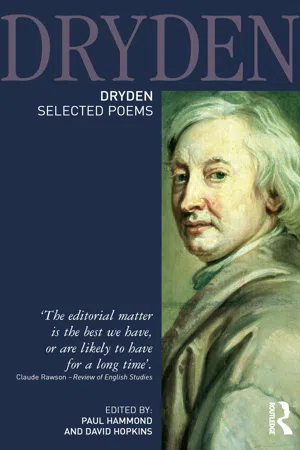Consecrated to the Glorious Memory Of his most Serene and Renowned Highness Oliver, Late Lord Protector of this Commonwealth, etc. Written after the Celebration of his Funeral
1
And now ’tis time; for their officious haste
Who would before have borne him to the sky,
Like eager Romans, ere all rites were past
Did let too soon the sacred eagle fly.
2
5 Though our best notes are treason to his fame,
Joined with the loud applause of public voice,
Since heaven what praise we offer to his name
Hath rendered too authentic by its choice;
3
10 Though in his praise no arts can liberal be,
Since they whose Muses have the highest flown
Add not to his immortal memory,
But do an act of friendship to their own:
4
15 Yet ’tis our duty and our interest too,
Such monuments as we can build to raise,
Lest all the world prevent what we should do,
And claim a title in him by their praise.
5
20 How shall I then begin, or where conclude,
To draw a fame so truly circular?
For in a round what order can be shewed,
Where all the parts so equal perfect are?
6
His grandeur he derived from heaven alone,
For he was great ere Fortune made him so;
And wars, like mists that rise against the sun,
Made him but greater seem, not greater grow.
7
25 No borrowed bays his temples did adorn,
But to our crown he did fresh jewels bring;
Nor was his virtue poisoned soon as born
With the too early thoughts of being king.
8
30 Fortune (that easy mistress of the young,
But to her ancient servants coy and hard)
Him at that age her favourites ranked among
When she her best-loved Pompey did discard.
9
35 He private marked the faults of others’ sway,
And set as sea-marks for himself to shun;
Not like rash monarchs who their youth betray
By acts their age too late would wish undone.
10
40 And yet dominion was not his design:
We owe that blessing not to him but heaven,
Which to fair acts unsought rewards did join,
Rewards that less to him than us were given.
11
Our former chiefs, like sticklers of the war,
First sought t’ inflame the parties, then to poise;
The quarrel loved, but did the cause abhor,
And did not strike to hurt, but make a noise.
12
45 War, our consumption, was their gainful trade;
We inward bled whilst they prolonged our pain:
He fought to end our fighting, and essayed
To stanch the blood by breathing of the vein.
13
50 Swift and resistless through the land he passed,
Like that bold Greek who did the east subdue;
And made to battles such heroic haste
As if on wings of victory he flew.
14
55 He fought secure of fortune as of fame,
Till by new maps the island might be shown
Of conquests, which he strewed where’er he came,
Thick as the galaxy with stars is sown.
